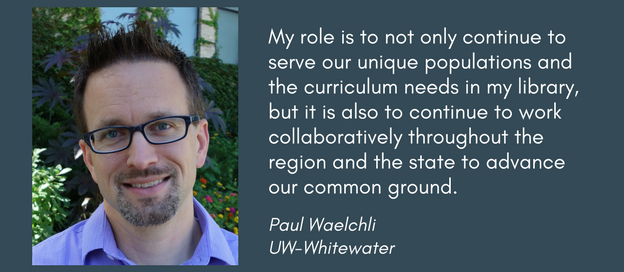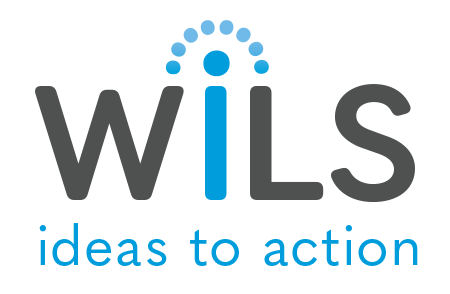
One of our greatest joys at WiLS is hearing our members tell the stories of the big and important work they are doing – interesting new projects or initiatives, or even interesting and new approaches to old projects. And, in addition to hearing about it, it makes us even happier when we can share those stories with other members. Each month, WiLS is proud to feature an interview with one of our library members. This month, we interview Paul Waelchli, Director of Andersen Library at UW-Whitewater and WiLS Board member!
Why did you, personally, choose to work in libraries?
I realized my passion for information literacy while pursuing a Master’s of Teaching. I was student teaching and discovered that what I really had a passion for was helping people develop questions and explore research that helped answer those questions. As librarians, we play a role in not only cultivating the information and helping patrons evaluate what they are reading, but we also play the role of teacher and mentor. Regardless of their age, we can journey with our patrons as they have the opportunity to develop into critical thinkers and informed citizens.
While I usually think about how I came to librarianship as an educator, there were hints much earlier in my life as well. I can recall keeping meticulously organized and preserved baseball card and comic book collections. So maybe there were earlier signs of interest as well.
What is unique about the culture of your library? How do you influence it?
This is my second academic year with the Andersen Library at UW-Whitewater and while there are areas that make every library culture a little unique, there are many more ways where we share similarities. Academic libraries of every size share more in common than we often admit.
My role is to not only continue to serve our unique populations and the curriculum needs in my library, but it is also to continue to work collaboratively throughout the region and the state to advance our common ground. The current students in school libraries are part of my future incoming class of students, and my current students are the future patrons (and parents of patrons) for public libraries. While there can be moments of satisfaction highlighting what makes us unique, there is more accomplishment in working together to strengthen our shared interests.
What do you think is important to know about the community you work with? What helps you understand their needs?
As part of the UW System, we serve students at the Whitewater campus and collaborate resources for students at any UW campus. These shared resources provide opportunities to collaborate and leverage our strengths at each campus.
In addition, as part of the UW System, we also have a responsibility to our region and our community. As someone who worked in politics before becoming a librarian, this sense of serving the greater public good creates exciting possibilities. Cultivating partnerships with public and school libraries can help my library understand and support the communities they serve.
What big ideas are being worked on at your library? What problems are being solved?
I feel the biggest idea that we at UW-Whitewater are working on is the current restructuring of the UW Colleges and the 2-year campuses. There are a lot of exciting possibilities for education and outreach, but there are a host of questions that everyone is still grappling with. While change has the potential to make institutions more cautious, libraries of all types have grappled with constant change for decades and we are well prepared to find new ways to fulfill our missions in spite of a shifting landscape.
Do you have anything else you’d like to share here?
My last position was at an academic library that shared space, collections, and resources with the city’s public library. Having advocated for libraries at both faculty meetings and city council meetings, I developed an appreciation for our shared core missions. I’m grateful for the formal collaborations that WiLS and other professional organizations provide and I’m looking forward to creating more informal collaborations that will help us educate our students, our patrons, and our state.
——————
These interviews are part of a series of interviews with both WiLS library and vendor partners. Your feedback is appreciated. If you have any to offer on this article, or suggestions for upcoming interviews, contact Andrea Coffin at acoffin@wils.org.
